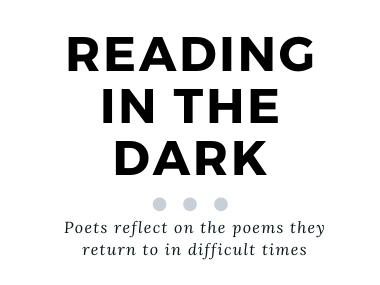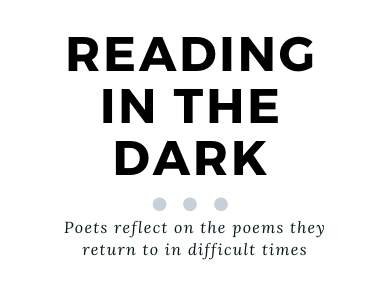Reading in the Dark
Tess Taylor on Gwendolyn Brooks’ “my dreams, my works, must wait till after hell”

my dreams, my works, must wait till after hell
I hold my honey and I store my bread
In little jars and cabinets of my will.
I label clearly, and each latch and lid
I bid, Be firm till I return from hell.
I am very hungry. I am incomplete.
And none can tell when I may dine again.
No man can give me any word but Wait,
The puny light. I keep eyes pointed in;
Hoping that, when the devil days of my hurt
Drag out to their last dregs and I resume
On such legs as are left me, in such heart
As I can manage, remember to go home,
My taste will not have turned insensitive
To honey and bread old purity could love.
Gwendolyn Brooks, “my dreams, my works, must wait till after hell” from Selected Poems. Copyright © 1963 by Gwendolyn Brooks. Reprinted with the permission of the Estate of Gwendolyn Brooks.
In response to the Coronavirus pandemic, we asked poets to write about the poems they return to in difficult times—to find solace, perspective, or even a moment of delight. Subscribe to the PSA newsletter for more Reading In The Dark responses and to keep updated with the PSA.
When I exit this room, as I will shortly after writing this note, I will re-enter the small catastrophe of my home—a bungalow where two parents struggle to work full time jobs even part time and two children also need care. The dishes are not done; the laundry is strewn; my son doesn’t understand fractions. My daughter is lonely. I will change out of my merely passable Zoom-worthy top, and the thin scrim of this “writer's life” will fall away, perhaps for days. I’ll run the machines, sweep the floor; pull out odd bits to craft into dinner. The writing I’ll do will be to make lists with care, because the grocery store lines are two hours long, if (only if) you get there on a weekday, which sometimes I can, for which I am grateful. I will clean my house, for which I am grateful.
We are so lucky, I keep saying: so lucky. And this luck is also privileged, also political. It is also fragile the way lungs are fragile. Also: the furious longing of these hard days, the cut of them. Sometimes, mopping the floor after the kids are in bed, or waiting in line at the market for food, I hear the voice in my head turn and mock me: “But, do you know how many women’s lives have ever been only this—market and cleaning, cooking and mopping, keeping children alive?” And, then with a sneer: “how dare you have once thought your life could be different?” And, this voice is not wholly wrong, even though is not kind. And: there is nothing for this time but a radical surrender, for which, I am also, at times, grateful. Still, the tight fury of this sonnet! The way in which it is motored forward by its deferred longings, by its bid to unlid those longings, even in such space. It is a jar for anger and honey. This is verse that can companion us, sliding from “incomplete” to “wait” and “hurt” to “heart.” In it I can feel my almost unspeakable domestic grief, a grief I might otherwise not dare to language, being as it is, domestic. I keep my eyes pointed in. But while I do, this poem is honey and bread.
—Tess Taylor
Tess Taylor is the author, most recently of Last West, part of the exhibition"Dorothea Lange: Words & Pictures" at the MoMA, and Rift Zone. She grew up and lives again in El Cerrito, California.

